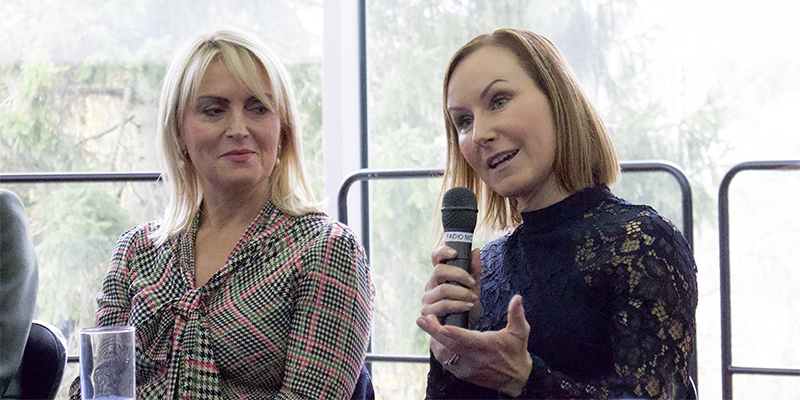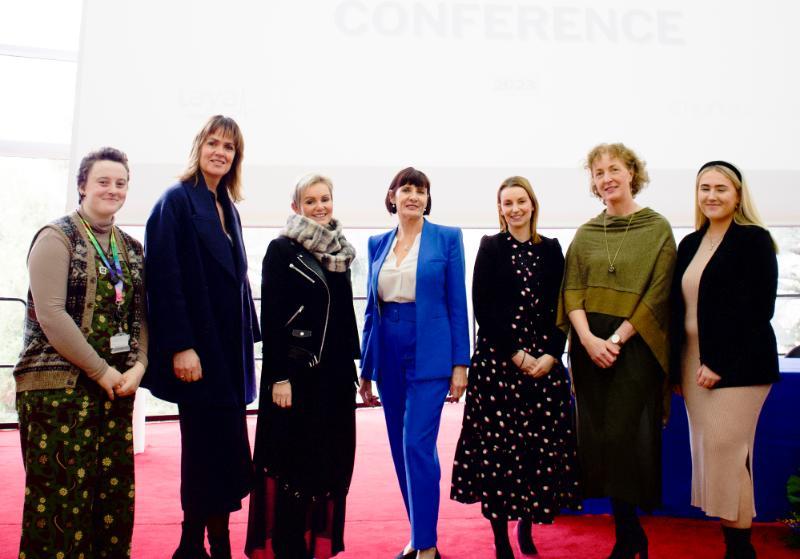- Home
- Staff Profiles & Phone Book
- About the Department
- Study Anatomy
- Study Neuroscience
- Research
- UCC Anatomical Donations
- Biosciences Imaging Centre
- BSc Medical and Health Sciences
- News & Events
- Contact Us
News & Events
BSc Medical and Health Sciences Students in UCC Translational Medicine Society host second Women’s Health Conference

A day of discussion on a range of issues ranging from menopause and endometriosis to the opportunities and challenges which face women in biomedical research took place in UCC's Devere Hall on November 25th, 2023. Sponsored by The Menopause Hub & Laya Healthcare, the lively and engaging discourse was interspersed with refreshments and movement breaks.
The conference was opened by Eli O'Driscoll, 3rd Year Medical and Health Sciences student, & Chairperson UCC Translational Medicine Society. Eli welcomed the speakers and guests and introduced Loretta Dignam, CEO of the Menopause Hub, who shared an insight to the work of The Menopause Hub.
- The opening panel discussion concentrated on Perimenopause, Menopause and Osteoporosis, and was chaired by Seamus Sugrue, 3rd Year BSc Medical and Health Sciences. Invited experts contributing to this session included Loretta Dignam, CEO of the Menopause Hub, Dr Fiona Barry, Chinese Medicine Practitioner, Dr Teesha Fitzgerald, Holistic Doctor & Craniosacral Therapist, Rachel Graham, Nutritionist, and author of “Meno-Morphosis- The Medicinal Cookbook for Women in menopause and Sarah Brereton, Nutritional therapist. A very engaging session discussed many aspects of menopause, how it's symptoms can manifest in a wide variety of ways and how it can go unrecognised and untreated for long periods of time.

Photo Panel 1: (l-r) Eli O’ Driscoll, Chairperson, UCC Translational Medicine Society; Rachel Graham, Nutritionist, author of “Meno-Morphosis- The Medicinal Cookbook for Women in menopause”; Dr Fiona Barry, Chinese Medicine Practitioner, Loretta Dignam, CEO of the Menopause Hub; Sarah Brereton, Nutritional therapist; Dr Teesha Fitzgerald, Holistic Doctor and Craniosacral Therapist; Emma O’ Regan, Vice-Chairperson UCC Translational Medicine Society.
A lively session discussed many aspects of menopause, how it can manifest in a wide variety of ways and how it can often go unrecognised and untreated for long periods of time. Dr Teesha Fitzgerald discussed the lesser recognised effects of menopause and how “manifestations of menopause, affect relationships with family, identity as a woman and as a person.” Discussions on the various treatments available followed and the need for holistic care during menopause. Diet, hormone replacement therapy and herbal medicine were among the treatments discussed. Rachel Graham stressed the importance of nutrition suggesting that “When you nourish your body properly, you will feel like yourself again or the best version or yourself.”
- The second panel focused on a range of Women’s Health issues including endometriosis, breast cancer, and polycystic ovary syndrome (PCOS) and the importance of education and research into these conditions. It was chaired by Emma O’ Regan, 2nd Year BSc Medical and Health Sciences. Invited speakers at this session included, Gill O'Shea, Nutritionist, Professor Martin O’Sullivan, Consultant Surgeon, Breastcheck, CUH and Bons Secours Hospital, and UCC, Dr Siobhain O’ Mahony, Senior Lecturer, Department of Anatomy and Neuroscience UCC, Ilanna Darcy, Vice-chairperson of the Endometriosis Association Ireland, and Andrew McGovern, PhD researcher in Women’s Health, University of Limerick.

Photo: Panel 2 (l-r): Eli O’ Driscoll, Chairperson, UCC Translational Medicine Society; Ilanna Darcy, Vice-chairperson of the Endometriosis Association Ireland; Professor Martin O’ Sullivan, Consultant Surgeon, Breastcheck, CUH and Bons Secours Hospital, Cork, Clinical Professor UCC; Dr Siobhain O’ Mahony, Senior Lecturer, Department of Anatomy and Neuroscience UCC; Gill O'Shea, Nutritionist; Andrew McGovern, PhD researcher UL; Emma O’ Regan, Vice-Chairperson UCC Translational Medicine Society.
The discussion focused on the importance of education and research into conditions such as breast cancer, polycystic ovary syndrome (PCOS) and endometriosis. Dr Siobhain O’Mahony illustrated the importance of research into the area of endometriosis describing how a person’s microbiome may affect the severity of their symptoms and detailed a study which showed that the “quantity of antibiotics consumed correlates with pain related to endometriosis,” and spoke on how that understanding has the potential to be developed into treatments for endometriosis.
The case for increased research, widespread education and a better understanding of endometriosis was made by Ilanna Darcy who shared her own difficult journey to receive a diagnosis of endometriosis. She detailed a long arduous process in which her condition was not understood or given credence by medical professionals and made a powerful case for the pursuit of better understanding of Women’s Health.
- The final panel, Women in Biomedical and Clinical Research was chaired by Eli O'Driscoll, and featured Niamh Horgan, Associate Director of Clinical Development, Eli Lilly Ireland; Hannah Stephenson, Clinical Trial Project Manager in Oncology, Eli Lilly Ireland; Dr Roisin Kelly Laubscher, Lecturer and researcher in the Department of Pharmacology and Therapeutics UCC; Louise Watson, PhD student, Breast Cancer Metastasis RCSI, Dublin and Dr Tanya Mulcahy, Director at Health Innovation Hub Ireland and founder of Femtech Ireland. This panel explored the experiences of women in biomedical research and the shortcomings of biomedical research experienced by women.

Photo: Panel 3 (l-r): Louise Watson, PhD researcher RCSI; Dr Tanya Mulcahy, Director at Health Innovation Hub Ireland & founder of Femtech Ireland; Dr Roisin Kelly Laubscher, Lecturer and researcher in the Department of Pharmacology and Therapeutics UCC; Hannah Stephenson, Clinical Trial Project Manager in Oncology, Eli Lilly Ireland; Niamh Horgan, Associate Director of Clinical Development, Eli Lilly Ireland.
This panel examined both the experiences of women in biomedical research and the historical shortcomings of biomedical research into women’s health.
Dr Tanya Mulcahy, suggested that it had only been thirty years since the FDA reversed a ban on most women taking part in clinical trials, and as a result in the medical world, “almost every product is designed for the average male”. Hannah Stephenson concurred that many groups of people have been left out of clinical trials, but that is now being addressed by industry, suggesting that diversity is now a requirement in clinical trials.
The panellists’ own journeys into the world of research were also discussed, and the challenges facing women in the world of research. The insight provided by the panellists was enlightening, with the take home message being that the elevation of women’s voices in both academia and industry is vital in ensuring that the next generation of researchers is empowered to pursue answers which stand to drive advancements in medical care for all.

Photo: UCC Translational Medicine Society Committee 2024: Back row l-r: Klaudia Drzymala, Vanessa Philips, Seamus Sugrue, Mary Garvin
Middle row: Michael Finnegan, Lia Subtil, Ali-Rose McCarthy, Seán O’ Regan
Front row: Eli O’Driscoll, Tze Throng Tan, Eve O’ Shea, Roisin McGonagle, Laoise Kirwan, Emma O’ Regan. Not photographed, Gráinne Myers, Ciara O'Kane, Jade Morrissey
UCC Translational Medicine Society thanked its speakers, audience, UCC Student Centre staff and its sponsors especially The Menopause Hub and Laya Healthcare.
For more on this story contact:
Photographs: Emer Neville.
Report: Seán O' Regan.
News item: Bereniece Riedewald.
